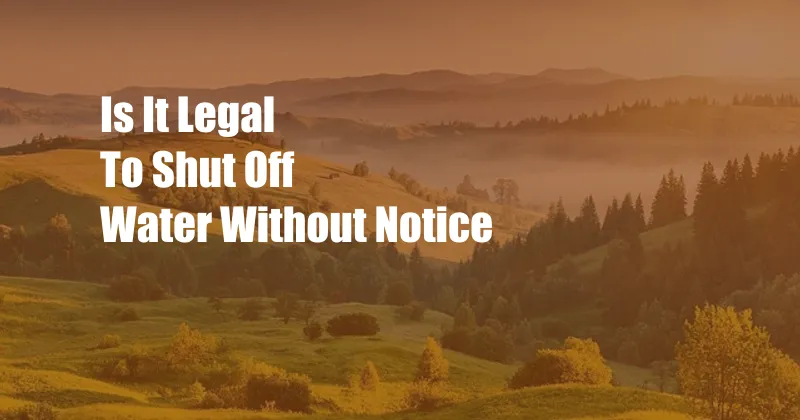
Is It Legal to Shut Off Water Without Notice? Implications and Legal Ramifications
Imagine returning home parched after a long day’s work, only to discover that your tap water has vanished. No warning. No explanation. This situation may leave you wondering, “Is it legal for my water to be shut off without notice?” In this comprehensive guide, we delve into the legal and practical implications of shutting off water without proper communication.
Subtitle: Understanding the Legal Framework
In most jurisdictions, water utilities are regulated by state or local laws, which vary in their specific requirements. Generally, these regulations impose certain obligations on water providers, including providing reasonable notice before disconnecting service for non-payment. Some jurisdictions may allow for immediate shutoff if there is an imminent health or safety hazard.
The Right to Reasonable Notice
The “reasonable notice” requirement ensures that consumers have sufficient time to resolve any outstanding payments or address any issues that may have led to the impending disconnection. The duration of notice varies, but it typically ranges from 24 to 48 hours. During this grace period, the water provider is expected to make reasonable attempts to contact the customer, such as through phone calls, emails, or written notices.
Exceptions to the Notice Requirement
In certain circumstances, water providers may be permitted to shut off water without prior notice. These exceptions include situations where there is an immediate threat to health or safety, such as a water main break or a contaminated water supply. In such cases, the water provider has a legal obligation to restore service as soon as the hazard has been resolved.
Legal Consequences of Improper Shutoff
If a water provider shuts off water without providing reasonable notice, it may be liable for damages. These damages can include compensation for any financial losses or inconvenience caused by the disconnection, as well as punitive damages in some cases. Consumers who have been improperly disconnected from water services may also be entitled to legal remedies such as an injunction to restore service or a lawsuit for breach of contract.
Tips for Avoiding Water Shutoff
To avoid the inconvenience and potential legal consequences of water shutoff, it is essential to stay current on your water bill payments. If you are experiencing financial difficulties and cannot afford your water bill, contact your water provider immediately to discuss payment options. Most water utilities offer assistance programs or payment plans to help low-income or struggling customers.
Expert Advice
“It is crucial for water providers to adhere to the legal requirements for providing reasonable notice before disconnecting service,” says water law expert Jennifer Smith. “Failure to do so can not only result in legal liability but also damage the trust between the utility and its customers.” Smith advises customers to promptly address any billing issues and contact their water provider if they receive a notice of impending disconnection.
Frequently Asked Questions (FAQ)
Q: What is considered reasonable notice before a water shutoff?
A: The specific notice period varies by jurisdiction but typically ranges from 24 to 48 hours.
Q: Can water be shut off without notice in case of an emergency?
A: Yes, water providers may shut off water without prior notice if there is an immediate threat to health or safety.
Q: What can I do if my water is shut off without notice?
A: Contact your water provider immediately to report the disconnection and discuss the reasons for the shutoff.
Q: Who is responsible for providing notice of a water shutoff?
A: The water provider is responsible for providing reasonable notice to customers before disconnecting service.
Conclusion
Understanding the legal implications of shutting off water without notice is essential for both water providers and consumers. By ensuring that water providers adhere to their obligations for reasonable notice and that customers stay current on their bill payments, we can prevent unnecessary inconvenience, potential legal disputes, and maintain the health and well-being of our communities.
Is this article of interest to you? Please share your thoughts and experiences in the comments section below.